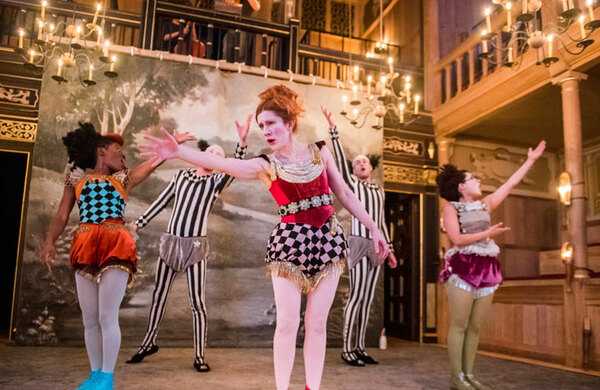The Merchant of Venice review
Abigail Graham’s stylish and deeply insightful production examines the toxic effects of prejudice and patriarchy
Grappling with the complexities of what is potentially Shakespeare’s most problematic play, director Abigail Graham’s bold production of The Merchant of Venice never pulls its punches.
Informed by a deep, tremendously sensitive reading of the text, Graham focuses unflinchingly on the prejudiced attitudes of the play’s protagonists, framing the piece as an excoriation of the cruelty, crassness and unrestrained bigotry that fester in a systemically racist society. This is a Venice packed with vain millionaires and out-of-control financiers, dominated by a Wolf of Wall Street culture of bottomless debauchery and impulsive risk taking.
Willing to risk everything, Michael Gould’s spiteful Antonio is restless and emotionally raw, a repulsive, unrepentant antisemite given depth through his obvious, heartbroken yearning for Michael Marcus’ dissolute, rarely sober Bassanio. The complexities of their relationship are only hinted at – a tangle of patronage, attraction and shared ambition – but there’s a chaotic, destructive edge to their intense intimacy.
Beside them, Eleanor Wyld is strong as Jessica, blinded by internalised self-hatred, seeking love and a new identity but failing to understand until it’s far too late that she’ll always be seen as an outsider. Throughout the closing trial sequence, she stands alone in the stalls, watching proceedings with mounting horror, finally understanding the unkindness of the world she’s sacrificed everything to be a part of. Sophie Melville’s preening, conceited Portia experiences similar moments of bleak realisation, pursued purely for her inherited wealth, used in a contrived act of revenge, then ignored entirely by a disinterested Bassanio.
As Shylock, Adrian Schiller gives a gripping, powerfully moving performance, his downbeat, softly spoken delivery a deliberate contrast to the heightened energy seen elsewhere in the production. Seemingly less filled with rage than disgusted by the overt malice of those around him, he drifts through his scenes under a heavy cloud of melancholy.
Sarah Beaton’s strong, stylish design complements the show’s themes. Her set depicts a brutal, quasi-industrial space of polished gold-toned metals lit by dancing candlelight. Disco balls descend from on high while stony-faced security guards seem to loom in every doorway. Antonio and his associates are turned out in a uniform of tan suits and powder blue shirts, contrasting with Shylock’s functional parka. Grotesque, gilded commedia dell’arte masks – explicitly chosen for their problematic connotations – hang from their belts, simultaneously symbolising their shared status while depicting the object of their disdain.
Tying the production together, Zac Gvi’s score is muscular and atmospheric. Bursts of celebratory wedding-band exuberance on keys and drums give way to stormy shivers of cymbals and ominously trudging woodwinds, evoking an unequal world that is for some filled with conspicuous glamour and for others tinged with constant menace.
More Reviews
Recommended for you
More about this organisation
More Reviews
Recommended for you
Most Read
Across The Stage this weekYour subscription helps ensure our journalism can continue
Invest in The Stage today with a subscription starting at just £7.99




















